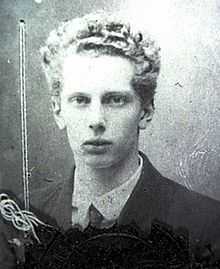Boris Blacher

Boris Blacher (19 January [O.S. 6 January] 1903 – 30 January 1975) was a German composer and librettist.
Life
Blacher was born when his parents were living within a Russian-speaking community in the Manchurian town of Niuzhuang (Chinese: 牛庄镇) (hence the use of the Julian calendar on his birth record). He spent his first years in China and in the Asian parts of Russia, and in 1919, he eventually came to live in Harbin. In 1922, after finishing school, he went to Berlin where he began to study architecture and mathematics. Two years later, he turned to music and studied composition with Friedrich Koch.
His career was interrupted by National Socialism. He was accused of writing degenerate music and lost his teaching post at the Dresden Conservatory.
His career resumed after 1945, and he later became president of the Academy of Arts, Berlin, and is today regarded as one of the most influential music figures of his time. His students include Aribert Reimann, Isang Yun, Maki Ishii, Fritz Geißler, Giselher Klebe, Heimo Erbse, Klaus Huber, Francis Burt , Gottfried von Einem, Kalevi Aho and Richard Wernick. See: List of music students by teacher: A to F#Boris Blacher.
Blacher was married to the pianist Gerty Blacher-Herzog . They had four children including the German actress Tatjana Blacher and the international violinist Kolja Blacher . He died in Berlin in 1975, aged 72; he was buried in an Ehrengrab in the Waldfriedhof Zehlendorf, Berlin.
Works
Works include:
- 1929: Habemeajaja, chamber opera, premiered 1987
- 1931: Streichtrio - Drei Studien über jüdische Volkslieder
- 1937: Concertante Music for Orchestra
- 1938: Symphony
- 1940: Fürstin Tarakanowa, opera
- 1940: String Quartet No. 2
- 1943: Romeo und Julia, chamber opera, premiered Salzburger Festival 1950
- 1946: Die Flut , radio opera
- 1947: Orchestral Variations on a Theme by Paganini
- 1948: Die Nachtschwalbe , Zeitoper in one act
- 1948: Violin Concerto
- 1949: Hamlet, ballet in a prologue and three scenes after Shakespeare by Tatjana Gsovsky
- 1949/52: Preußisches Märchen , ballet-opera in six scenes
- 1950: Lysistrata, ballet in three scenes after Aristophanes
- 1952: Piano Concerto No. 2 (in variable metres)
- 1953: Abstrakte Oper Nr. 1 , experimental opera in one act
- 1954: Viola Concerto, Op. 48
- 1955: Der Mohr von Venedig, ballet in 6 scenes and an epilogue after Shakespeare by Erika Hanka
- 1956: Orchester-Fantasie Op. 51
- 1960: Rosamunde Floris, opera
- 1963: Konzertstück for Wind Quintet and Strings
- 1964: Cello Concerto, premiered by Siegfried Palm[1]
- 1964: Zwischenfälle bei einer Notlandung, electronic opera
- 1965: Tristan, ballet in seven scenes by Tatjana Gsovsky
- Ariadne, short opera
- 1969: Anacaona, six poems by Alfred Tennyson about the Indian Queen Anacaona
- 1969: 200 000 Taler, opera after Sholem Aleichem's story "Dos groijse Gewins"; premiered at the Deutsche Oper Berlin[2]
- 1973: Yvonne, Prinzessin von Burgund, opera in 4 acts
- 1974: Poem for large orchestra (1974), dedicated to Tatjana Gsovsky
- 1974: Variationen über ein Thema von Tschaikowsky ("Rokoko-Variationen"), for cello and piano
Blacher wrote the libretto for Gottfried von Einem's operas Dantons Tod (1947) and Der Prozess (1953).
References
- ↑ Cello concerto
- ↑ "200000-Taler-Mißverständnis" by Heinz Josef Herbort, Die Zeit, 3 October 1969 (German)
External links
| Wikimedia Commons has media related to Boris Blacher. |
- Boris Blacher page on Boosey & Hawkes website
- Boris Blacher A Centenary Sketch by Dr David C F Wright
|